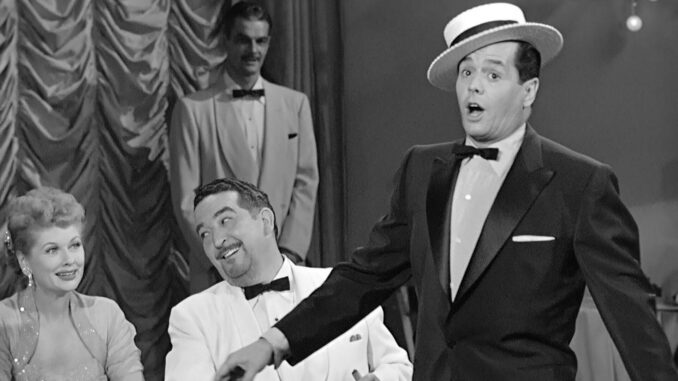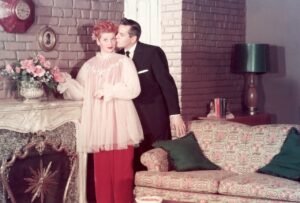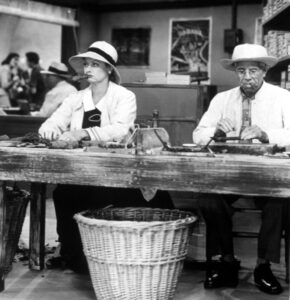
“I Love Lucy,” one of America’s most beloved sitcoms, did more than just bring laughter to living rooms across the nation—it gave millions a fantastical view of Cuba. In the 1950s, “I Love Lucy” depicted Cuba as a dream-like land filled with music, romance, and adventure. Lucy Ricardo’s marriage to Cuban musician Ricky Ricardo made Cuba feel familiar and exotic all at once, weaving Cuba’s allure into the American dreamscape.
This article explores how “I Love Lucy” created a romanticized image of Cuba and its cultural impact. Was it a realistic portrayal, or did it simply project an idealized version of Cuba that appealed to audiences hungry for an exotic escape?
The Power of ‘I Love Lucy’ in American Culture
The Beginnings of ‘I Love Lucy’ and Its Allure

When “I Love Lucy” first aired in 1951, it quickly became a cultural phenomenon. With Lucille Ball’s comedic genius paired with Desi Arnaz’s Cuban charm, the show felt fresh and unlike anything America had seen before. Ricky Ricardo, a charismatic Cuban bandleader, introduced the nation to a lively cultural identity that was both accessible and exotic.
Cuba’s Allure in Post-War America
In the post-World War II era, America had a heightened curiosity for other cultures. With economic prosperity on the rise, people were eager for new experiences, and Cuba became a prime target for American tourism. “I Love Lucy” tapped into this interest, giving audiences a taste of Cuba from the comfort of their homes.
How ‘I Love Lucy’ Shaped America’s Vision of Cuba
The Magic of Ricky Ricardo’s Character
Ricky Ricardo was more than just a character—he embodied Cuba itself. His thick accent, musical talent, and passionate personality were packaged to create a version of Cuba that America would fall in love with. Ricky’s character introduced many Americans to Spanish phrases and Cuban music, sparking curiosity about Cuban culture.
Romance and Mystery of Cuba’s Landscape
Though the show was filmed in the United States, scenes set in Cuba often featured mentions of its tropical beauty, vibrant nightlife, and rich cultural history. By setting some episodes in Cuba, the show framed the country as a paradise for adventure and romance.
Lucy and Ricky’s Relationship: A Bridge Between Cultures
Lucy and Ricky’s marriage, though fictional, represented a cultural union that resonated with American viewers. Their relationship gave people a sense of closeness to Cuba, making the country feel like an extension of the American family rather than a distant foreign place.
The Appeal of Cuban Music in American Homes
Desi Arnaz was an accomplished musician, and his portrayal of Ricky Ricardo allowed him to showcase Cuban music on American television. His band’s Latin rhythms gave “I Love Lucy” an edge that other shows didn’t have. Songs like “Babalu” became synonymous with Cuban culture, introducing Americans to the rhythms of Cuba.
The Idealization of Cuba vs. Reality
A Filtered Fantasy of Cuban Life

While “I Love Lucy” gave Americans a taste of Cuba, it did so through a romanticized lens. The Cuba that Americans saw was filtered to remove any political or social issues. Instead, it focused on music, passion, and humor, elements that were universal and uncontroversial.
The Impact of the U.S.-Cuba Relationship
The political relationship between the United States and Cuba was complex, even in the 1950s. However, the show carefully avoided such themes, giving viewers an unspoiled view of Cuban life. This filtered portrayal created a kind of utopia that influenced American perspectives, as real-life political challenges remained unseen.
Cuba as a Dream Destination
For many Americans, the Cuban experience on “I Love Lucy” sparked the idea of Cuba as a dream vacation spot. Havana was often depicted as a city of endless nightlife and beautiful landscapes, creating a longing for a country that, in reality, was quite different from the paradise portrayed on-screen.
Desi Arnaz’s Influence on Cuba’s Popularity in the U.S.
The Rise of Cuban Culture in 1950s America
Desi Arnaz’s portrayal of Ricky Ricardo wasn’t just entertainment—it was an introduction to Cuban culture. Arnaz’s popularity helped pave the way for other Cuban artists in America, creating a ripple effect that bolstered Cuban influence in U.S. music and culture.
Breaking Stereotypes and Introducing a New Image
In a time when many Americans viewed foreigners with skepticism, Ricky Ricardo helped break down stereotypes. His character, although comedic, was charismatic and relatable, helping to foster acceptance and admiration for Cuban culture in mainstream media.
The American Fascination with Cuban Music
Cuban music, particularly mambo and salsa, gained popularity partly due to “I Love Lucy.” Ricky Ricardo’s performances ignited a musical trend that extended beyond the show, with Americans flocking to Cuban-themed clubs and bars to experience the rhythmic beats for themselves.
The Show’s Legacy on U.S.-Cuba Perception
Nostalgia for a Time and Place That Never Was
Today, “I Love Lucy” represents an era when Cuba held a unique place in American pop culture. The nostalgia for this Cuba—a land of endless music and laughter—lingers on, even though that version of Cuba was an illusion crafted for television.
How This Idealization Lingers in Modern Media
Even modern shows and movies sometimes reference this idealized Cuba. Hollywood often leans on the vibrant, romanticized version of Cuba that “I Love Lucy” showcased, keeping alive a cultural fantasy that still resonates with American audiences.
How ‘I Love Lucy’ Influenced the Way Americans See Cuba Today
The idealized portrayal of Cuba on “I Love Lucy” continues to shape American perceptions, even decades later. For many, Cuba remains synonymous with vibrant music, romance, and mystery—an image firmly rooted in the fantasies crafted by one of television’s most iconic shows.
Conclusion: The Timeless Allure of Cuba Through ‘I Love Lucy’
“I Love Lucy” offered Americans a fantasy of Cuba—a country filled with joy, music, and romance. Though it was an idealized vision, it has left a lasting impact on how Americans perceive Cuba even today. Ricky and Lucy’s love story became symbolic of two cultures coming together, bridging the gap between American audiences and Cuban culture in a way that remains unparalleled.